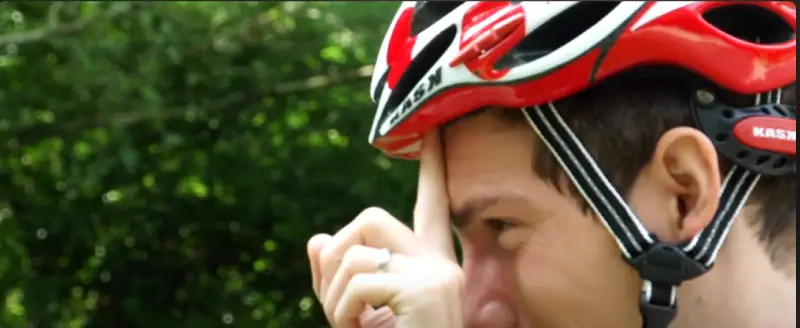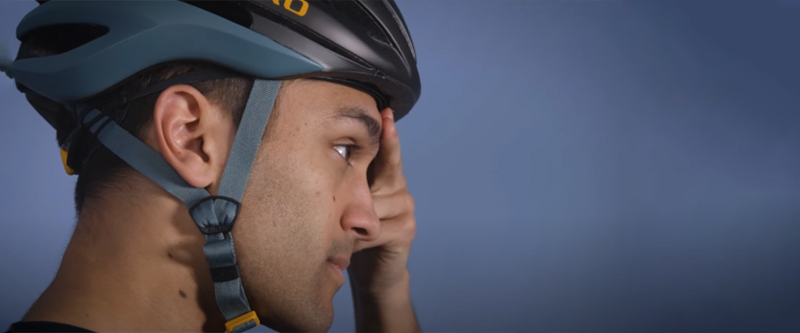Head tingling may be caused by nerve-affecting conditions like infections, diabetes, MS, occipital neuralgia, or trigeminal neuralgia. Other potential reasons are anxiety, migraines, head injuries, seizures, or autoimmune disorders.
Tingling in your head while cycling may result from sustained pressure on nerves, disrupting blood flow and causing paresthesia, a tingling or numb sensation.
This pressure on the pudendal nerve in the saddle area can lead to abnormal sensory signals to the brain. Adjusting your posture and reducing pressure points can help ease this tingling sensation.
In this post, we’ll explore various factors that could lead to head tingles while riding a bike, from equipment issues to health-related causes, and offer practical solutions to ensure a comfortable and safe ride.
Why Is My Head Tingling While Cycling? 5 Causes Inside

You might experience head tingling while cycling for several reasons. Here are some common causes:
Helmet Issues
Wearing a helmet that doesn’t fit properly can lead to discomfort and tingling. Here’s why:
- Pressure Points: A too-tight helmet can create pressure points on your head, affecting blood flow and causing tingling.
- Straps and Padding: Too tight or misplaced padding can press on nerves, leading to a tingling sensation.
Poor Circulation
Good circulation is key to staying comfortable while cycling. Poor circulation can cause tingling in your head:
- Restricted Blood Flow: Tight clothing or gear can restrict blood flow to your head, leading to tingling.
- Positioning: Holding your head in one position for a long time can reduce blood flow and cause tingling.
Nerve Impingement
Nerves can become compressed during a ride, leading to tingling:
- Neck Position: Bending your neck at awkward angles can pinch nerves, causing tingling sensations.
- Back Alignment: Poor posture on the bike can also lead to nerve compression and tingling.
Weather
The weather can affect how you feel while cycling:
- Cold Temperatures: Cold weather can reduce blood flow to extremities, including your head, leading to tingling.
- Humidity: High humidity levels can cause sweat and moisture to build up, irritating the skin and causing tingling.
Paresthesia
Paresthesia is a medical term for tingling and can be caused by several factors:
- Overuse: Long rides without breaks can lead to paresthesia because of nerve fatigue.
- Health Conditions: Underlying conditions such as diabetes or vitamin deficiencies can cause tingling during cycling.
Head Tingling While Cycling: 11 Major Factors

Some cyclists experience a strange tingling sensation in their heads. We will explore potential health-related factors and equipment considerations that might cause this issue.
7 Health-Related Factors
Various health issues can cause a tingling sensation in your head while cycling. Understanding these can help you address the problem and enjoy your rides safely.
Dehydration
When dehydrated, your body lacks the fluids it needs to function correctly. This can cause:
- Dizziness.
- Headaches.
- Tingling sensations.
Nutritional Deficiencies
Lack of essential nutrients can affect your nervous system, causing tingling. Key deficiencies include:
- Vitamin B12.
- Magnesium.
- Iron.
Anxiety and Stress
Physical symptoms associated with stress and anxiety can include a tingling head. When you’re anxious:
- Your muscles may tense up.
- Your breathing might become shallow.
- You might feel light-headed.
Migraines and Headaches
Migraines can cause various symptoms, including tingling sensations. Migraines are often accompanied by:
- Severe headache pain.
- Nausea.
- Sensitivity to light and sound.
Sinus Infections
Sinus infections can cause pressure and tingling in the head. Symptoms include:
- Nasal congestion.
- Facial pain.
- Headaches.
Diabetes
Damage to nerves caused by diabetes can produce tingling sensations. If you have diabetes, you might also experience:
- Frequent urination.
- Extreme thirst.
- Fatigue.
Multiple Sclerosis (MS)
The MS condition affects the nervous system and can cause tingling. Other symptoms include:
- Muscle weakness.
- Coordination problems.
- Fatigue.
4 Equipment Considerations

When it comes to cycling, the equipment you use plays a crucial role in your comfort and safety. Here are some essential factors to consider.
Bicycle Fit
A properly fitted bicycle is essential for a comfortable and safe ride. Here’s why:
- Importance of a Properly Fitted Bicycle: An incorrectly sized bike can lead to poor posture and increased pressure on your nerves, which makes your head tingle.
- Impact on Posture and Nerve Function: The fit of your bike affects how you sit and hold yourself while riding. If your bike doesn’t fit well, it could lead to nerve compression and discomfort.
Cycling Position
Your cycling position influences your overall comfort. Maintaining the right posture can prevent nerve issues.
- Correct Posture to Avoid Nerve Compression: Sitting upright with a slight bend in your elbows helps disperse weight, reducing the risk of nerve compression.
- Exercises to Maintain Good Posture and Flexibility: Regular stretches and exercises for your back, shoulders, and neck can help you maintain proper posture during rides.
Helmet and Head Position
Helmets are crucial for safety, but their position can also affect your comfort.
- Proper Helmet Fit: Ensure your helmet fits snugly without being too tight, as an improper fit can affect blood flow and nerve function.
- Head Position: Keeping your head neutral, neither too far forward nor backward, can prevent muscle strain and nerve compression.
Muscle Overuse
Overusing specific muscles during cycling can also contribute to tingling sensations.
- Muscle Fatigue and Strain: Repeated use of the same muscles can lead to fatigue and tension, which may cause nerve irritation.
- Preventive Measures: To avoid overuse, incorporate rest days into your training schedule and perform exercises that target different muscle groups.
3 Preventive Measures and Solutions
Taking steps to prevent tingling sensations while cycling involves attention to equipment, exercise, and riding technique.
Proper Equipment Use
Using the right equipment correctly is essential for preventing discomfort.
- Choosing the Right Helmet: Ensure your helmet fits properly. Your hat should fit snugly but not too tightly, and it should sit level.
- Adjusting Your Bike Fit: Make sure your bike is adjusted to fit your body. This includes the height of the seat and handlebars, which should match your size and riding style.
Exercise and Stretching
Incorporating regular exercises and stretches into your routine can help prevent nerve issues.
- Neck Exercises: Perform gentle neck stretches to relieve tension and improve flexibility. For example, slowly tilt your head from side to side.
- Shoulder Exercises: Strengthen your shoulders with exercises like shoulder rolls and stretches to maintain good posture while cycling.
Riding Technique
Maintaining a healthy posture while riding can reduce the risk of nerve compression.
- Tips for Healthy Posture: Keep your back straight and your elbows slightly bent. Avoid hunching over the handlebars.
- Consistent Posture Checks: Regularly check your posture during rides to ensure you are not slouching or straining your neck.
Conclusion
Head tingling while cycling can stem from various causes, from improperly fitted helmets and poor circulation to more severe health conditions like dehydration or nutritional deficiencies. It’s essential to listen to your body and promptly address any discomfort, whether adjusting your gear, tweaking your riding posture, or consulting a healthcare professional.
By taking these steps, you can enhance your cycling experience, making each ride more enjoyable, safe, and comfortable.
FAQs
Why Does My Head Spin While Biking?
Head spinning while biking can be caused by various factors, including poor circulation, Meniere’s disease, BPPV, hypotension, migraines, neurological disorders like Parkinson’s disease, anemia, hypoglycemia, or dehydration. It’s essential to consider underlying health conditions and seek treatment from a healthcare professional.


